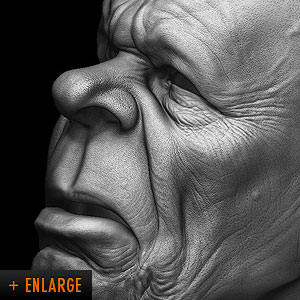
Six time Oscar winner, talks about his work, his perspective on the industry and ZBrush. It was a very enlightening conversation with a man who in Rick’s modest words is “good at what he does”. Rick is more than good at what he does. He is legendary at it. What is more, he is downright honest, direct and real about it. Thank you Rick.
For those who don't already know you, how would you introduce yourself?
Well, you know I always called myself a "makeup artist," but it's doesn’t really describe what I do. It's just that when I started out as a kid a makeup artist is what I wanted to be. They were the guys that made the monsters, the jobs kind of evolved over the many years. And now I call myself a "special makeup effects artist" … but I do animatronics and creature design and all kinds of stuff, so, I don't know what to call myself.
Well, that works! What started you in the industry, or, to rephrase this: There's a boy in Binghamton New York, one-hundred and seventy-eight miles from Manhattan, two-thousand seven-hundred miles from Hollywood, he sees Frankenstein for the first time, what's running through his mind? What is it that gets under his skin and makes this, this, uh, "makeup artist" the career he wants?
I was actually born in Binghams New York, but I grew up in Southern California in Covina. My parents left Binghamton when I was like, not even one, so, it was "a boy" in Covina.
Ah…So, how long in did you live in Covina?
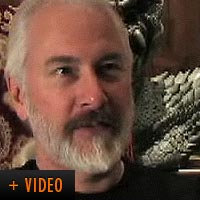
I lived in Covina for, until I got married and moved out of the house when I was like twenty-something.
Nice. So you were in this area and around the effects industry the whole time?
Well, in Covina… There was nobody in the movie business in Covina that I knew of. And I grew up very lower/middle class in a tract house where every other house was exactly like mine and it cost my parents six-thousand dollars for this house brand new and they had a thirty year loan on it, you know. My mom was a bank teller you know, and my dad had a variety of crappy jobs from working at Sears to driving a truck, it was of course a difficult time in his life so we didn't have a lot of money but we did have a T.V. set, and you know, Frankenstein was definitely one of the films that really made me want to do this kind of stuff. I just thought the monster itself was such a cool thing and just eventually realized by reading Famous Monsters of Filmland Magazine that there's this guy Jack Pierce who made this guy look like that and, I thought, that's kind of a cool thing to do. I was just fascinated, not just by Frankenstein, but any monster movie I saw on television.
That's cool. I was looking back through your old posts, and I realized that the very first post you did at ZBrush Central was Frankenstein.
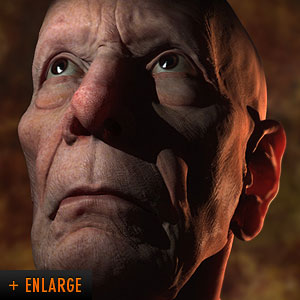
Yep, Frankenstein's monster. Yeah. Well, yeah. I think the very first thing I actually made and I'm surprised more people haven't figured out before I signed my piece there with my real name who I was, besides the fact that I used the screen name "Monster Maker," which I'd been calling myself "Rick Baker-Monster Maker" since I was a teenager anyways, so you know…
I always had a fascination with skulls and um, things like that as well. So the first thing I did was the skulls and the next thing I did was Frankenstein's monster 'cause again it was something that I, I mean I love Karloff's face, I love that makeup and I figured it was something that I'd like to make a model of.
Very cool. Yeah, you really blew a lot of people away with that first post. I know it's one of the all-time best first posts on the forum.
You know, I looked back at it just recently and I was surprised at how crappy it was…
I only had ZBrush for two weeks or something when I did that. And then the first two weeks I didn't have the manual or anything and I was just trying to figure out the program like I'd normally do just kind of playing with it and seeing what it does, but it was so different from anything I'd used before. I finally broke down and thought, "I have to get the manual to this thing." You know, that's when I joined the forum 'cause I had to do that to download the practical manual and it said come up with a screen name, or whatever, and I just did "Monster Maker," just because it's something I knew I could remember and I really had no intention of ever posting any work on the forum. I only joined it to get this manual. And what happened was… it was like an instant love at first sight.
I thought, "This is so cool!" you know. But I still had a lot of questions and I actually found, I got the "Practical Manual," I didn't actually download the manual for the earlier version until later. You know I found it kind of thin on a lot of information and, as much as I hate reading manuals, I wanted to learn more quickly, so I thought “I'll post something." 'Cause I thought that the monster turned out half-way decent and I thought, for a beginner, I'll post this, and maybe somebody'll like it and respond and I'll get some answers for some of my questions.
"Iv'e practically ZBrushed every day... I can't get enough. It's just a great program. I just love it so much."
Yeah, I noticed on the post you had uh, it, it almost says one of the same things I said on my very first post of “God-bless the person who made this," or …
Yeah…
Or “You can have my first born." Or…
(laughs) Oh, I still feel that way. It's been seven months and hasn’t changed since I first started doing this. And, and I've practically ZBrushed every day since then. I can't get enough. I was doing it right now when you called. It's just a great program. I just love it so much.
Well, what is it about working in ZBrush that really got you into it? 'Cause I think in the beginning you mentioned that there was a two month period where you were just all the time, in ZBrush.
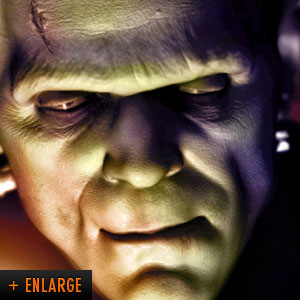
Well I've always liked making things and sculpting and painting and making masks and all those things. I've been doing Photoshop for something like sixteen years. That was my first love affair. It's kind of like "no fear painting". You know when I used to do designs for films or in paintings I would draw and paint in a traditional manner and the problem was the painting itself would be a good painting but the design wasn't necessarily what I had envisioned in my head. Many times I'd leave it alone because I was afraid to screw up a good painting, you know.
About sixteen years ago I had somebody working for me that had a little bit of knowledge about computers, not, not a whole lot. But I said "I'd like to be able to do this on a computer and be able to save this and we ended up getting a computer and I got Photoshop and right away, it was an instant love affair. I could draw something, save it, and always go back to it, you know. You don't have to worry about screwing it up. And what I also loved about it was the paints always dry. The paints always wet. You can always go back and change it. You know, you can smudge it whenever you want to you don't have to wait for a week for the stuff to dry so you can put another glaze of color on it. And I just love it so much. I used to do paintings on acetate over actors' photographs, like something that people have seen, like the Michael Jackson, making the Michael Jackson "Thriller." I had a color Xerox of him off of the cover of Rolling Stone or something and I had pieces of acetate on different layers that I would paint changes on and then Photoshop eventually got layers, which they didn't have when I first started, I think, you know.
And it was pretty much doing the same thing, only starting with a photo of the actor's face. And, and then you also had the option of taking your color right off of that, you know. Picking colors right out of your photos. I love that so much. But the problem with Photoshop still, especially starting with the photo of an actor you have a front view of something and you want to see it from the side you’ve got to do it again. You know, you got the lightning on the photograph. You can paint the light, I've done this before where I kind of change the light in the way I paint it, but what's great about ZBrush is that I had played with other 3-D programs before and I actual have a lot of fun with ZBrush. I'd play a lot with Aftereffects and I've always been interested in visual effects and those kinds of things, but I'm not a math person? I just didn't like the way that you would make models in traditional kind of 3-D packages. I just couldn’t do anything that I thought was organic, it just didn't work with the way that I work. There are some people who are kind of mathematical or very scientific about the way they do things. I'm more organic about it. I just want to get in there and start pushing stuff around and do something? And that's what I liked about ZBrush. It was so much like sculpting. When I made my first skull it was based on the modeling of a simple head or something and started with a sphere, and the fact that you could just push and pull the sphere and cut into it and add to it turn it around and look at it and light it and paint it. That was so cool. That was so much like sculpture, you know.
Only you can mirror it.
Yeah! You can sculpt both sides at the same time. Exactly. Which I usually try to change at some point because I don't think symmetrical things look real. You know, people's faces aren't perfectly symmetrical.
Right.
But it speeds up the time a lot. And then it's just the fact that when I started understanding the program more and using Projection Master to texture it and such it's stuff that we would do in clay that would take days and you can do it with this "digital clay," in an hour. You know, it's just so cool.
That's awesome. Kind of along those lines, can we talk about your work process a little bit?
Okay.
What's a basic day in the life of Rick Baker?
You mean, on ZBrush or in …
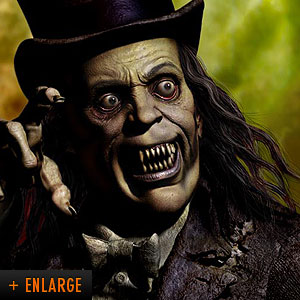
Let's say, in the film business.
Well, I got into this business 'cause I really enjoy the work. And, unfortunately, it is a business, and a lot of people know and have read that I've kind of taken some time off 'cause I'm getting disenchanted with the whole business aspect of it.
I love the work. I like makin' stuff. But I didn't get into this to, to be a business man, for one, and I'm just getting real tired of the stuff. For most of my career I've been really hands-on. I design the characters and sculpt the stuff and apply the make-ups and paint it and put hair on it and do all that kind of stuff. Now, more than anything, its design work. I have a crew of great people. There are these sculptors who work for me: Mitch Devane and Kazu Tsugi who are both amazing sculptors. They can sit down for eight hours a day and sculpt and not be bothered with anything else. Well, at least Mitch can. Kazu does loads of other things for me. When I sculpt something I put in a little bit of time and then I get a phone call about something and then I put in a little more time and then I get another call or somebody else who's working for me needs something so I've kind of handed a lot of the sculpting tasks over to other people. Some projects I'll start out, like when we did Planet of the Apes, I blocked out the sculptures on a lot of the characters: this is how thick I want it, this is what I want it to look like and hand it over to somebody like Mitch or Kazu who would then texture it and clean it up. In the last couple shows that I've done lately I come up with the initial design work and up until recently that's been using Photoshop until ZBrush came into my life.
How does ZBrush work into the design process?
Well, I've only used it on one project so far, it was actually a design project for a film that I don't even know if it's going to happen, but it had some aliens in it.
It just worked out so well. One of the things I like about this is you build up a library of parts that you have. When you make a head, you can use that head again, you can change it into whatever you want, into another head. So over these seven months I've gotten all kinds of bones, faces, and things that I've done, that I can just start with as a base.
On this alien design thing, instead of just doing Photoshop paintings, I started with a base head and then changed it and used different alien designs, and I was doing four or five different aliens a day and it would be something that looked like a completed, textured, painted sculpture that I could light however I wanted to and look at it from whatever angle I wanted. And then when we decided to actually translate into a real 3-D thing by sculpting it as on a life-cast of somebody it was able to print up besides a front view, a side view, a three-quarter view, a top view, a bottom view and every view I wanted with different lighting as a guide for our sculpture. I like the speed of it and I like the fact that it's a real 3-D thing that you can really visualize what the final thing is going to be.
The problem I found though when, i'm using the ZBrush thing, it's also a problem in doing any kind of 2-D work, even in Photoshop over an actor's face you can cheat (laughs).
Starting with an actor's head as the base and you start pushing and pulling it around and eventually you lose that, where the actor really is underneath. And in the real world when we're doing a make-up, we can't lose that. So, I found on this alien thing we were doing, even though I was trying to be very careful and trying to keep the proportions right and not push something in beyond where the person's nose would be, for example, I did.
You kind of get caught up in the moment, just start making this cool looking design and then realize that, well, I can't actually really do that.
You also paint on canvas, you're actually versatile on a lot of mediums: oil painting, the CG side that we're talking about, Photoshop, ZBrush, sculpting, and glazing techniques…
Mmm-hmm
Quite a repertoire of skills…
Well it kind of all came about again with my fascination with monsters and make-up and wanting to do that and I also realized that if I was going to design stuff I had to somehow communicate that design to producers and actors. So I started learning how to draw and paint and I always liked making things look real and tried to learn to paint in a way that something actually looked very photographic and real and I still like it. To be honest I really like digital painting better just because it's like I said, the no fear aspect of it and you don't have to wait for paint to dry and there's not the smell and so on, but there's something nice about really pushing paint around and having the final piece right there in front of you and not
having to print it and not having it look different when you print it than it does on the monitor and things like that, you know?
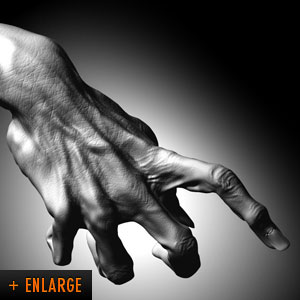
What other directions is Rick Baker going in?
(laughs) Just goin' down…
Yeah I've gotten to the point where I'm getting older and realize there's kind of an end in sight and it's not that far off, you know. The unfortunate thing about the film business is its taken major steps backwards. I started out in low budget independent films that were shot in ten days and you had a couple weeks and a few hundred bucks to make a monster and you could just do the best you could do and you worked for the two weeks you worked with no sleep and got something done, you know. It was always very frustrating ' cause you knew you could do something better and films started to evolve in a way that bigger budget science fiction or horror films were being made and they started giving you a little more time. When we did American Werewolf in London, John Landis asked me what it would take to make this as cool as possible, and I said, you know, more time, more money. So, the first time I had some sort of budget, I mean, it's nothing compared by today's standards, but I think I had something like six months and we were able to make something that was that much cooler and people, producers and people in the industry started realizing if they gave us more time and more money, we could do something. I had some films I did where I had a year's prep time to build the stuff. What's happening is that it's all about release dates. A lot of times they don't even have a script but they have a release date, they want the movie to come out, and then you got to start making stuff and they've cut down the pre-production time and post-production time for so many films that it's getting back more to that independent thing where you just do what you can with what your given. I don't want to turn out crappy work and I just don't want to be busting my butt doing something that's not the way that it should be done for a film that's not very good so it doesn't quite have the same appeal to me. I have this big studio that I've built and it's a cool nicely set up place that I don't particularly want to get rid of yet so I figure if a film comes along that I really am interested in doing and if there's adequate time and money, I'll do it. If not, I'll just be doing my own stuff, probably ZBrush and then goofin' around. I've got a couple ideas for some books that I want to do.
Cool
.…books that actually would involve ZBrush a lot. So that's something I'm looking forward to having the free time to do.
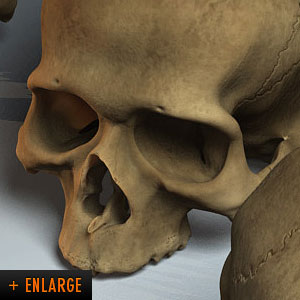
All that free time that you have now, right?
(laughs) Yeah.
Just a few more questions. Is it true that ZBrush and ZBrush Central introduced the famous Rick Baker to email?
(Laughs) Well like I said. I've been using the computer for a lot of years doing the Photoshop stuff and artwork and all that, but I never used the word processing part. I'm dyslexic and I don't have much of a vocabulary. I'm not a good typer and things like that. I don't read my mail. I get stacks of mail. My wife say’s, "You know you got some really nice fan mail from this guy, you should really send a response." Which is usually a piece of paper with a couple words on it, "Thanks for your nice note," you know. I've never been big on spending my time typing and talking to people about stuff like that. So yeah, ZBrush Central came along and I had to type stuff and it took me like I said on some of those earlier posts, took me longer to type the two or three sentences than it did to do the piece. But, yeah, I started getting email from people and actually answering it and sending email and it's kind of changed.
Are you on the internet now almost as much as your kids?
Uh, no, no, no. Nowhere near as much. I was never really hooked up to a high speed internet thing until I got that, until I got ZBrush, and I found it very frustrating to wait for the dial up thing. So I just was never that interested. But it is a great reference source, the internet, you know. But ZBrush Central is still basically about the only thing I do. I'm not a real big web surfer person.
Well, can we expect more posts from Monster Maker?
I don't know. You know, it's kind of, it's… I really enjoyed being anonymous…And the problem is I put, and it's my own problem, but I put this really high standard for what Rick Baker's work is suppose to be. When I was Monster Maker, I think I said this, I could post any old crap, you know. I actually had fun sharing what I was doing today. I sat down for a couple of hours and I did this. Look, Monster Maker did this thing. It's not that cool but he did a couple interesting things so… But "Rick Baker" has a harder time doing that. Since I've come out of the closet so to speak I haven't post anything yet. It kind of freaks me out that people know that it's me, you know. But the funny thing is, like I said, right now I was working on some ZBrush stuff, just eating my lunch and doing something, and I think it's pretty cool and I was thinkin', well, maybe when I finish this, I'll have to post it, so, I don't know yet…
Well, not, not to influence you, but I know a lot of people would miss having Monster Maker's posts there.
Yeah, I did seem to get a lot of responses like that and it's like “Please keep posting Monster Maker, we enjoy seeing your stuff." And it's nice and I, it's funny, you got this whole group of friends that you don't really know.
People who you know will respond to your stuff and you respond to their stuff. It's interesting. I quite liked getting this response from people that I didn't really know and didn't know that it was me, you know?
Right.
I've got this reputation at being pretty good at what I do and I think sometimes that people will just think whatever I do is good because I'm supposed to be good, you know…But the fact that I didn't have that on there and people still liked it well, okay, maybe I'm not so bad. You know? They actually liked this guy Monster Maker's work too.
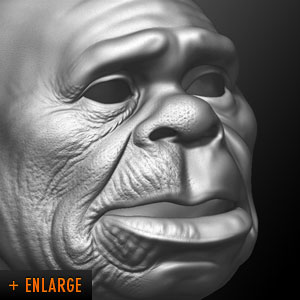
Alright, one last question. What advice can you give to artists with monster-making ambitions just starting out? Particularly now that you've been through this process and the whole industries has changed and we're now looking at this bright slightly digital future.
Yeah, I still think a marriage of the techniques is the way to go for a lot of things, but if somebody was really starting out and really wanted to be a monster-maker so to speak… I think the digital way is the way to go. I think make-ups will never totally go away. I think the kind of stuff that we're working on now in the film when we're doing age make-ups on somebody, I think that's still a better way to do it than digital tracked on make-up on an actor.
Though I can see, definitely see, and I've done some tests for myself, actually years ago, of digital make-up. Where there's a limit to what you can do with make-up on an actor's face on the computer I get a thing where I move the eyes and made the eyes wider, or moved an eye higher or made it bigger or whatever, you know. I can't do that really with make-up.
And that's kind of how I got into the animatronic aspect. I didn't like the limitations of make-up. You can only build up so much before it gets masky. If the guy has a big nose, the monster has to have a big nose?
If you're makin' a puppet head, you can sculpt anything you want. That's something I really like as well about doing the digital stuff. You can make anything you want. You don't need that actor inside, you know.
Design-wise it's limitless. If somebody really just wanted to make monsters and creatures and stuff start learning the digital stuff. The animatronics stuff is really kind of going away. If anything it now seems to be, well, it costs us a little less money to do these four or five shots with an animatronic hand or an animatronic head and then we'll do the rest of the cool shots with the CG thing?
Rick, thank you for taking the time to answer our questions. I really appreciate it and I know everyone in the ZBrush community appreciates all the work you do.


